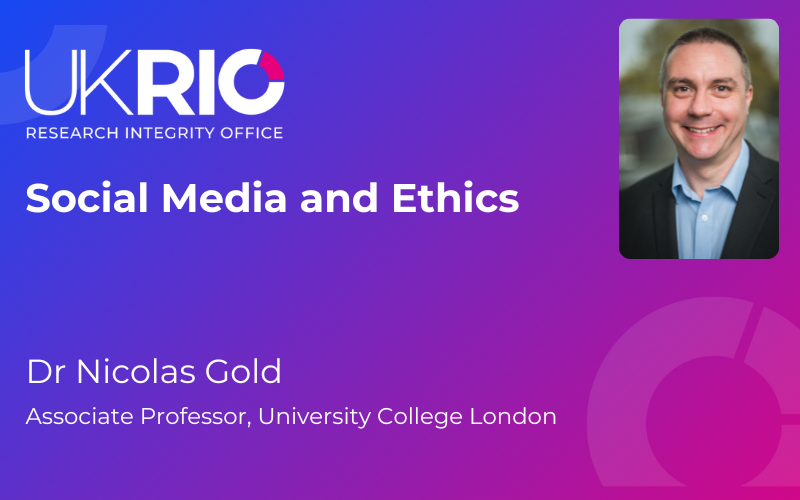Social media and ethics
Wednesday 21 February 2024 10:00-11:00 BST
Research using social media data presents several ethical issues that researchers must navigate to ensure the responsible and respectful use of this data. Some of the primary ethical issues in research using social media includes privacy and informed consent, anonymity and confidentiality, data ownership and terms of use, ethical use of algorithms and AI, sensitive topics and vulnerable populations, consent and minors, deception and online identity, unintended consequences, and transparency and reproducibility.
This webinar discussed these ethical concerns that require a combination of thoughtful consideration, adherence to research guidelines, and engagement with relevant stakeholders, including social media platforms and users.
SPEAKER
Social Media and Ethics
Dr Nicolas Gold, Associate Professor, University College London
The social media data landscape is complex, dynamic, and evolving. This means that it poses particular challenges to researchers wanting to undertake ethically defensible research. In this talk I discussed these complexities, drawing out some key aspects that need to be addressed when considering the ethics of an intended investigation. I aimed to offer some principles and approaches for building ethical arguments in this space, drawing on foundational principles and recent research. I also briefly highlight some key aspects in terms of specific platforms that may impact how researchers approach their investigations.
Attendees heard about:
– The identification of some key ethics issues when using social media data.
– An approach to constructing arguments for ethically defensible research in this space.
– A brief “tour” of some platform terms and their potential impact on research.
To watch the webinar video click here. To view the slides click here. *Please note for these slides: Except where otherwise licenced as shown, all material is Copyright © Nicolas Gold 2024, unauthorised reproduction is prohibited, and the ingestion and use of this material for training any kind of AI or other algorithmic model is strictly prohibited.
Dr Nicolas Gold, Associate Professor, University College London
Biography
Nicolas Gold is an Associate Professor in Computer Science at UCL. His research interests cover software engineering, research ethics, and computing education involving music and making. He teaches professional practice and ethics in software engineering at UCL and contributes to the teaching of auditory computing. As co-chair of the UCL Computer Science Research Ethics Committee, he regularly undertakes ethics review on a wide range of topics and has contributed to ethics guidance and policy departmentally and in the wider institution. He has also reviewed for and served on the UCL central REC. Outside of UCL, Nicolas is currently the lead ethics officer for the New Interfaces for Musical Expression (NIME) conference series and a contributing author to its ethics code. He also serves on the UKRIO register of advisors. Alongside his other areas of academic publication, in recent years Nicolas has co-authored papers on ethics in mining software repositories, the role of publishing communities in promoting ethical values, and post-research ethical duties on researchers who use software in their research. He also contributed to the ethics supplements for the ACM SIGSOFT Empirical Standards for Software Engineering Research.

